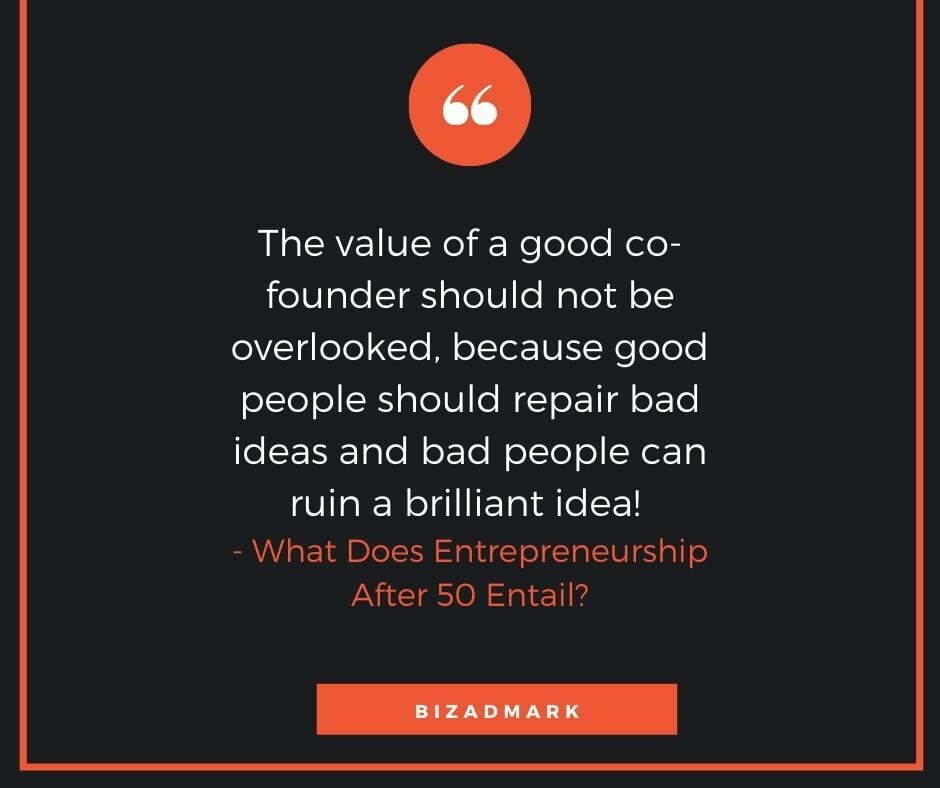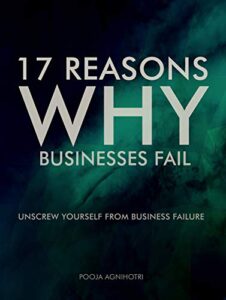We all are apprehensive about venturing into entrepreneurship after 50. I mean it’s only human to think so right? But that’s what makes it an exciting adventure too.
With age comes experience and with experience comes expertise. It might be something you have wanted to do for a long time. And if you think the timing is right now, you should do it.
Seek the niche you really enjoy and don’t be afraid to go for it.
Age is just a number, it’s all about what you want and when you want it. So entrepreneurship at 50? I say hell yes!
It’s a great deal of work, of course, and a lot of hours. When you choose entrepreneurship at 50, you are investing all of your passion and emotions into it.
Let me tell you something. Recently, among retired people seeking to commit their newfound free time to a hobby business, or to finance their retirement dreams, has become a trend in entrepreneurship.
In the U.S, the highest rate of entrepreneurship is between the age group of 55 to 64 years. People over 55 are twice as likely as those in the 20-34 age groups who are willing to start a new business.
That is some awesome statistic right. Your dream to begin entrepreneurship at 50 is valid, on point, and a beautiful one. So why not give it wings? Let’s see how we can do that.
Entrepreneurship After 50? 4 Benefits
“Your work is going to fill a large part of your life, and the only way to be truly satisfied is to do what you believe is great work. And the only way to do great work is to love what you do.” –Steve Jobs, Co-Founder, Chairman and CEO, Apple
A lot of people thinking to undertake entrepreneurship after 50 have inhibitions. But I will tell you why they should actually be the most confident.
1. Experience Speaks the Answers You Seek
Firstly, you at or after 50 are far more experienced than others. You have seen more, learned more, and understood more. So, you have an experiential advantage here.
You understand people better, you understand the industry better and you understand the corporate functioning better. So, you will be in a better position to make overall decisions and functioning when you venture into entrepreneurship.
2. Financial Stability and Standing
Next, to help you start, you typically have a financial buffer.
We all know that you will have a stronger and more stable financial standing than anyone who is trying to venture into entrepreneurship below the age of 50.
I am not saying all are the same, but a common consensus is that people above 50 have a better, stable, and strong financial standing. And that is what will help you in your entrepreneurial venture.
You can invest in marketing and advertising activities, incorporate all kinds of quality suppliers and people for your business and you can do more than a normal entrepreneurship venture can do. All in all, a win-win situation already.
3. A Network to Begin Entrepreneurship After 50
Then, you have a network. If you start in an industry in which you have already served as consumer or future clients, you have a network to call on.
You’ll be supported by this network. A study shows that the majority of successful entrepreneurs are middle-aged.
One of the core reasons for that is network building. Since you are a product of experience, working, and long-standing understanding of the industry, clients, suppliers, and more.
You have a better set of networks to power through, and that’s what makes your entrepreneurship after 50 a much stronger initiation.
4. Working on Your Passion
Starting a company in your 50’s can be an ideal way to reconnect with your passions. It’s indeed normal to think about how we are going to support ourselves in the decades ahead.
We are looking after our children in our 20s, 30s, and 40s, juggling jobs and nurturing our relationships and social ties.
We are too busy for much of our lives to note that we have put our dreams on the sidelines. After the age of 50, you will find a reason for your existence.
Meet people who share the same idea as you and interact to get an idea about the things that revolve around your work environment. Another advantage of doing business at this age is that you can keep your mind, body, and soul healthy.
Your daily thinking, working, and achieving will give you a sense of relief and satisfaction that nothing else will give you. Ultimately, you will find peace in what you love to do.
How to Start Your Entrepreneurship Journey After 50? Easy 8-point Checklist
Starting a company after 50 is also an inner journey to find meaning and give back to society. That’s enormously satisfying.
But that’s not it, being an entrepreneur after 50 isn’t as risky as you would think and it can be well worth the psychological and financial payoffs.
Everything that you learned till now, you can finally apply to a practical environment to achieve success.
So how do you begin your journey of entrepreneurship after 50? Let’s take a look.
Step 1) It All Starts with an Idea
You cannot begin entrepreneurship at 50 or at any age without an idea. I am sure if you are thinking of starting an entrepreneurial venture, you must have thought of something that you will give to your customers.
However, don’t worry if you don’t have an idea yet. You might have just thought of starting a business of your own. So, the next thing you need is to know the kind of business that you want to open. What will be your value proposition?
Once you have finalized what your value proposition is going to be, your entrepreneurial venture’s wheels will begin churning.
So, start with an idea. An idea of what you are going to do, who you are going to serve, and what is your vision and mission.
Step 2) Check the Feasibility of That Idea
Merely deciding on an idea isn’t enough. Ultimately, you want your business to succeed. Therefore, the next step is to check the feasibility of your idea.
Do extensive market research and check the competition in the industry you want to operate, check the demand of the product or service you are planning to offer, check the cost of setting up the business in that industry, and the cost of production as well.
This is not an exhaustive list. There are many other factors that will need to be reviewed before you choose to go with a particular business.
Step 3) Time to Work on Your Business Plan
Once you have an idea, you have to start the process of planning it out.
Gone are the days when we could afford hit and trial for our businesses. With competition skyrocketing for everything, we need to be absolutely vigilant and thorough in planning out our business.
Without a proper plan of action, you will lack direction. Entrepreneurship isn’t easy. It requires a clear vision and plans to carry it out. And that’s where you need to begin.
Step 4) Find a Partner
Networking will be useful. Partnering with young people will prove great as well. You have network, experience and younger partners will have current market understanding and technical knowledge.
The ones who will drive you forward to success are your network, your squad. Network with individuals working in the area you are looking at.
This will not only give you a healthy kick start to your entrepreneurship venture, but it will also make sure you develop a strong, steady, and proper base in the competitive market.
Step 5) Register Your Business
The next step in your entrepreneurial venture is to register your business. A lot of people do business without actually registering it.
While this may work well for them in short term., registering your business will be more feasible for you in the long term.
With your business being registered, you will open yourself to a plethora of benefits and opportunities. Moreover, you will also get support from the authorities and various mitigation benefits too.
This way, registering your business will open you to a new horizon and you will shine.
Step 6) Have a Marketing plan
The most critical part of any organization is having a proper marketing plan. This strategy must address all your questions, but it must also help you determine how your clients will be identified.
This is typically the trickiest task for individuals because if you already worked for a company, the company took the clients to you. You’ve got to go out now to find them.
Your three main techniques are analysis, networking, and word-of-mouth.
Having a proper marketing plan in place will not only make your entrepreneurship after 50 a highlight amongst your competitors, but it will also help you get the customers you desire.
You can either do it all by yourself if you know what all goes into marketing and advertising or you can hire a marketing and advertising agency like Bizadmark to do it for you.
Step 7) Start Marketing & Advertising
This is the digital age, and you have to make sure your entrepreneurship after 50 adds social media age to its venture.
You can use social media to the fullest. To generate more awareness about your company, use Facebook, Instagram, Twitter, YouTube, etc.
Moreover, use LinkedIn to promote if it is a B2B company, one that provides services to other companies.
Step 8) Read Your Data to Improve Your decision-making
A lot of entrepreneurs start a business but only a few look at the data and analyze it.
You shouldn’t be the one to make that mistake. I am sure at 50, you have a lot of experience of how markets operate. This means that you know the importance of reading and analyzing data.
When you pay attention to analytics, you will have a clear understanding of what is working for your business and what is not.
Then, you can make necessary changes in your business plan to improve the areas that seem weaker and upgrade the areas that are seemingly strong.
However, you won’t be able to do any of this if you don’t pay attention to the data. Always remember, creativity and data go hand in hand.
So, be creative but also back it up with analytics.
What are the Challenges of Entrepreneurship After 50?
It can seem appealing to have the ability to be your own boss and spend your time doing work that you enjoy. But it can be reckless as well.
It comes with its own set of challenges. But that’s what makes it more appealing.
For any entrepreneur, seeking a successful co-founder is very difficult, no less than seeking himself or herself an accommodating better half.
The value of a good co-founder should not be overlooked, because good people should repair bad ideas and bad people can ruin a brilliant idea! Click To Tweet
An idea of not having any cofounder is appealing too, but that comes with its own set of challenges.
To manage everything on your own, you need to have a clear understanding of what you are getting yourself into. And as exhausting as it may be sometimes, it is going to also be worth it.
Next, most new-age businesses leverage technology. Practically speaking, Not all of us will have many technological ideas.
As an entrepreneur, however, it is important to accept certain changes that have occurred over the last decade and adapt to those changes to relate more to your target audience, and that’s what you should also seek to do.
The next challenge you face is a financial challenge. Even though entrepreneurs at 50 have the cushion of money to fall back on, they are also using that money in their business. So there is always the monetary risk attached.
Another challenge an entrepreneur faces after 50 is health challenges. Starting a business requires a lot of meetings to get funding, legal work done, and get clients. Plus the long work hours and delayed revenues can cause a lot of mental stress.
Entrepreneurship isn’t easy. Even after 50, with all the wisdom in your pocket, it comes with its own set of challenges.
It requires time, effort, patience, and dedication. But there’s nothing that you cannot overcome right? So let’s see how we can overcome these challenges.
How to Overcome Challenges of Entrepreneurship After 50?
The minute you decide that you want to become an entrepreneur is the minute that you sign up for something you would consider bigger than yourself.
But if you are in it to win it. The most meaningful part of entrepreneurship is that you strive to have a healthy vision about what you want in the long term, as the founder.
There’s no glory in the good old-school way of doing it. Not when it comes to managing your business.
Moreover, it’s no surprise that technology controls every arena today. With all of those devices, you can explore worlds from your own home.
Believe in persistence. The more practice you get under your sleeve, the more habit and the better you will be able to cope with the regular obstacles to entrepreneurship, the more routine you will begin to make decisions.
Furthermore, with entrepreneurship, you are on your own. So you need to decide what are your strengths and your weaknesses.
This is particularly important when it comes to leadership experience.
So, do it if you’re in your 20s or 30s and you want to start a company. And if you are in your 50s still give it a try.
Examples of Successful Entrepreneurship After 50
Here is a closer look at some of the famous entrepreneurs who started their business after 50.
Look where they are now, successful and happy in what they are doing. Let’s take a look at them and get inspired.
Mommy Sauce
Mommy Choi is the owner and chef of Mommy Sauce. Out of a love for cooking and family, her company was born.
Encouraged by her son, a famous chef, Mommy established her own company, offering to the world her secret sauce recipes.
In 2015, when she was 71, she began her company. And now it’s flourishing.
KFC
The famous Kentucky Fried Chicken (KFC) chain was founded by Harland Sanders at the age of 62.
Harland Sanders owned a gas station in Kentucky at the age of 40, after serving in the army and working a variety of different jobs, and served fried chicken to get in more clients
He became popular ultimately for his recipe. KFC began when the then 62-year-old Sanders franchised his recipe to a friend in Salt Lake City, Utah.
The business had expanded to hundreds of franchises a decade later, and Sanders sold his ownership for $2 million.
Huffington Post
Arianna Huffington launched The Huffington Post when she was 55.
An immigrant from Greece, Arianna worked for the first time as a writer, penning biographies.
But it was not until she was 55 years old that she launched The Huffington Post in 2005, and appointed herself its chief editor.
McDonald’s
When he was 52, Ray Kroc founded the now-famous McDonald’s.
Ray Kroc ate at a restaurant owned by two brothers in 1954, Dick and McDonald’s Mac.
Kroc was pleased with their food and operations, so he turned their company into a franchise the following year, when he was 52, and founded McDonald’s System, Inc.
The food became a sensation immediately, selling the hundred millionth McDonald’s burger just three years later.
Martha Stewart Living Magazine
When she wrote her first magazine, Martha Stewart Living, Martha Stewart was nearly 50.
She began her career on Wall Street as a stockbroker, but when her family moved to Connecticut in 1972, she left her job.
There, a 19th-century farmhouse was restored, stirring her passion for homemaking. She began a profitable catering company over the next few years.
The business continued to become an empire, which included more magazines, more books, and TV shows.
Takeaway: Entrepreneurship After 50
“The secret of getting ahead is getting started. The secret of getting started is breaking your complex overwhelming tasks into smaller manageable tasks, and then starting on the first one.” –Mark Twain, American Humorist and Author
Therefore, you would be a part of the growing demographic in this nation if you are considering venturing on an entrepreneurial journey at 50 or beyond.
For anyone starting a new business idea, adjustments must be made. You will be doing just fine as long as you keep your eyes wide open and on the reward.
The Stories of Deadly Business Mistakes That You Should Absolutely Avoid
The secret to success in business isn’t doing what other successful people have done; it’s by avoiding the mistakes made by businesses that have failed. Instead of repeating their mistakes, now we can learn from them and best ensure business growth and commercial success.
17 Reasons Why Businesses Fail brings the cautionary tales of mistakes made by many businesses that ultimately led to their failure and which other businesses should avoid at all costs if they plan to survive and grow. Get your copy.
Related articles














